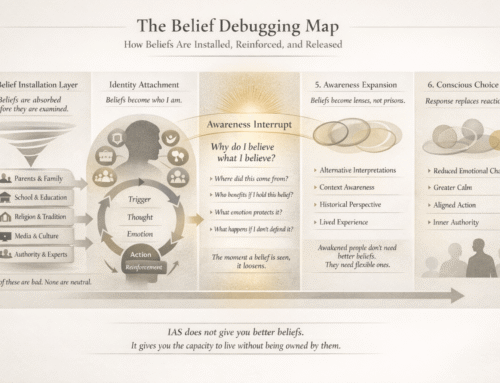I read about the fact that our clients are looking for ‘transformation’ but what does this really mean. I fed this into ‘Thought-Leader Engine’ GPT and it turns out that, in addition to results, a much deeper spiritual change is sought that most creators, consultants and coaches may not have fully considered.
We toss around the word “transformation” like it’s just a before-and-after picture. But if you’ve ever coached someone through real change—or lived through it yourself—you know better.
Transformation isn’t just about getting results. It’s about becoming someone new. And that’s where most marketing, coaching, and messaging fall flat.
Let’s dig into what people are really saying when they whisper (or shout):
“I want transformation.”
1. Identity Upgrade: “Let me become who I’ve always wanted to be.”
Transformation isn’t just about doing different things. It’s about being different. Your clients aren’t just looking for new habits—they’re trying to become the kind of person who naturally lives those habits.
They want to stop being the overthinker, the people-pleaser, the one who hides. They want to become the action-taker, the voice-in-the-room, the aligned leader.
That shift? It’s identity-level. And it doesn’t happen through logic alone.
Real transformation is a release—not just an acquisition.
They’re not just adding skills. They’re shedding skin.
(It so happens that I have recently developed a GPT called ‘Act As If’ which is meant to help us to step into the mindset and identity of our successful future self — and act from it daily. I will release this shortly!)
2. Internal Peace: “Help me feel whole again.”
A surprising number of people are chasing transformation to escape the mental noise: shame, self-doubt, imposter syndrome, inconsistency.
The problem isn’t that they don’t know what to do. It’s that they don’t feel safe or worthy enough to do it consistently.
They want the calm that comes when they stop fighting themselves. They want congruence—alignment between their values, voice, and actions.
That’s why a checklist or framework isn’t enough. They need someone who helps them feel seen, not just optimised.
“I want transformation” often means “I want to stop feeling broken.”
3. Emotional Safety: “Don’t let me fall apart while I let go.”
Change is threatening. Even if the old self wasn’t working, it was familiar. Safe.
Transformation means shedding the roles that used to protect us:
- The achiever who earned love through success.
- The nice one who avoided conflict.
- The helper who never asked for help.
That’s scary. Your people don’t just need strategy. They need emotional safety to dismantle an old identity. They need your belief in the version of them they’re becoming.
Transformation is grief work in disguise.
4. Permission + Power: “Can I really want this much more?”
Underneath the desire to transform is often a quieter question:
“Am I allowed to want this?”
To want more money, impact, freedom, visibility, love, self-expression… For many, that feels like betrayal. Of their upbringing, their gender role, their culture, their past self.
They want to transform, yes—but they also want permission to desire. They want someone to say, “Yes. You get to want what you want. And you don’t have to justify it.”
Empowerment begins where permission is granted.
5. New Narrative: “Help me rewrite the story I live in.”
At the heart of transformation is a story shift.
From: “I’ve always been the shy one” To: “I’m someone who leads with quiet power.”
From: “I always give up on myself.” To: “I show up for myself even when it’s hard.”
From: “Success is for other people.” To: “I create what I want—on my own terms.”
Most transformation doesn’t happen in a single breakthrough. It happens as someone begins to live into a new narrative—day by day. And your job? Help them believe the new story before it’s fully true.
Transformation isn’t just change. It’s authorship.
The Bottom Line
If you’re in the business of helping people change, don’t just market outcomes. Speak to the spiritual work of transformation:
- Becoming.
- Releasing.
- Aligning.
- Empowering.
- Rewriting.
That’s where the real power lies.
Want help turning your lived wisdom into powerful, bold content?
Thought-Leader Engine helps midlife creators, coaches, and solopreneurs extract their deepest insights—and shape them into authority-building content that positions you as a category of one.
If you’ve got transformation in your bones, let’s turn it into magnetic messaging that moves people.
Let’s build your thought leadership on truth—not trends.







[…] Previous […]